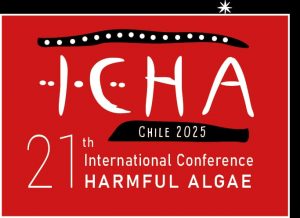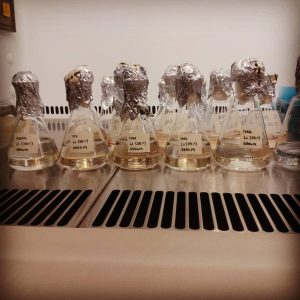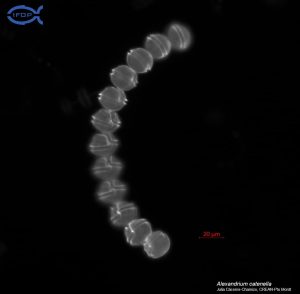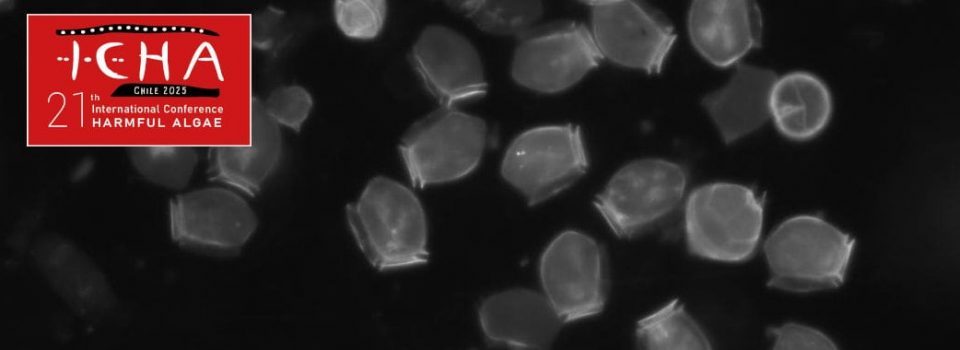Important harmful blooms and marine toxins international scientific conference will be held during October 2025, in Punta Arenas’s city.
December 13th, 2023 It will be organized by Fisheries Development Institute
It will be organized by Fisheries Development Institute
Between November 5th and 10th, at Gran Prince Hotel in Hiroshima Japan, the Harmful Algae International twentieth version conference, known by its acronym ICHA in English (International Conference on Harmful Algae), was held. carried out every two years.
Harmful algal blooms are natural events caused by different microalgae, some of which produce toxins or other compounds that contaminate seafood, affect public health and cause mortality in aquatic ecosystems’s organisms and also in aquaculture systems farming. Its effects can be of great intensity for affected communities social and economic sectors. Currently, these blooms and toxic outbreaks have become more frequent and cover new geographical sectors, and the effect of extreme oceanographic climatic situations (such as El Niño and La Niña; Antarctic Oscillation or Southern Annular Mode) and climatic change cannot be ruled out, at a global level, in this type of events occurrence. Harmful algal blooms affect various countries, not only in marine ecosystem, but also in lakes and rivers ecosystems. Consequently, there are various scientists groups, distributed throughout the planet, aimed at achieving a better understanding of these blooms and their effects, and in turn, each country or region has developed capabilities and has means that allow them to monitor and manage these blooms occurrence effects.
 Next ICHA’s version will be held in Chile, in Punta Arenas city, between October 19th and 24th, 2025. Our country selection was a consequence of an application made in 2021 during ICHA’s nineteenth version development, which was held in La Paz, Mexico. This application was made to Harmful Algae International Scientific Society assembly (ISSHA), at that time chaired by Dr. Vera Trainer from USA and which, in the next two years, will fall to Dr. Dedmer van de Waal from the Netherlands, who receives management chaired by Dr. Wayne Litaker from USA.
Next ICHA’s version will be held in Chile, in Punta Arenas city, between October 19th and 24th, 2025. Our country selection was a consequence of an application made in 2021 during ICHA’s nineteenth version development, which was held in La Paz, Mexico. This application was made to Harmful Algae International Scientific Society assembly (ISSHA), at that time chaired by Dr. Vera Trainer from USA and which, in the next two years, will fall to Dr. Dedmer van de Waal from the Netherlands, who receives management chaired by Dr. Wayne Litaker from USA.
For this reason, last November 10th, during ICHA20’s special session meeting, organized by ISSHA assembly. Dr. Leonardo Guzmán from Fisheries Development Institute had the opportunity to remember and motivate attendance at the meeting to be held in Chile, an occasion that was propitious to highlight this type of event’s importance and responsibility that its organization represents for Chile, in addition to stimulating attendance at this meeting, highlighting the importance that it takes place in the Southern Hemisphere, particularly in the southern tip of America, in Chile, and in Punta Arenas’s city . On the occasion, a video related to ICHA 21, Magallanes and Chilean Antarctic region and the place where this meeting will be held was presented, highlighting its historical particularities , geographical and diverse natural attractions that the southernmost region of the country exhibits.
 These conferences usually bring together between 400 and 600 people, from at least 50 countries, which represents a great challenge not only for the country, but also for IFOP, which will have the greatest responsibility in organizing this scientific meeting. In the coming days, the first meeting will be held aimed at taking the first steps towards planning and fully assuming commitments linked to this scientific event, an instance in which a high proportion of national scientific community, oriented to harmful algal blooms and marine toxins topic is expected to participate.Without prejudice to this, all institutions and people linked to FAN are invited to support and participate in this important scientific event. planning and implementation.
These conferences usually bring together between 400 and 600 people, from at least 50 countries, which represents a great challenge not only for the country, but also for IFOP, which will have the greatest responsibility in organizing this scientific meeting. In the coming days, the first meeting will be held aimed at taking the first steps towards planning and fully assuming commitments linked to this scientific event, an instance in which a high proportion of national scientific community, oriented to harmful algal blooms and marine toxins topic is expected to participate.Without prejudice to this, all institutions and people linked to FAN are invited to support and participate in this important scientific event. planning and implementation.
The twenty-first ICHA’s version that will be held in our country constitutes the third opportunity to be held in a Latin American country, since it had previously been held in Brazil 2016 and Mexico 2021, and three quarters of these meetings have been held in Northern Hemisphere countries .
Press related links:
